Ever wondered why are so many “young and fit” dying of heart attack and stroke?
Many of us go to the gym to be fit and healthy. We try following a nutritious diet. Lean is the new name for being healthy. And then when we hear a 40-year-old man, who regularly goes to gym and lives on salad, suddenly collapses to a heart attack– it beats all logic.
And COVID-19 pandemic has suddenly led to significant increase in such stories of heart attacks and strokes in young adults.
In this article, we will discuss and try to understand why we are suddenly hearing about so many young adults dying of heart attacks, and is there a simple way to prevent this.
Table of Contents
Genesis of Heart Attacks and Strokes
Human body is like a big machine. Each organ needs energy to function. This energy comes from the food we eat and the oxygen we inhale. Nutrition from food and oxygen from our breath are collected by blood. Blood flows through pipes called blood vessels. And through these pipes blood supplies packets of energy to all the organs.
If some section of this pipe gets clogged or bursts up, the organ supplied by this damaged pipe will starve to death. So, if the pipe supplying blood to the heart gets damaged, it will lead to heart attack. Similarly, stroke results from interruption of blood supply to the brain.
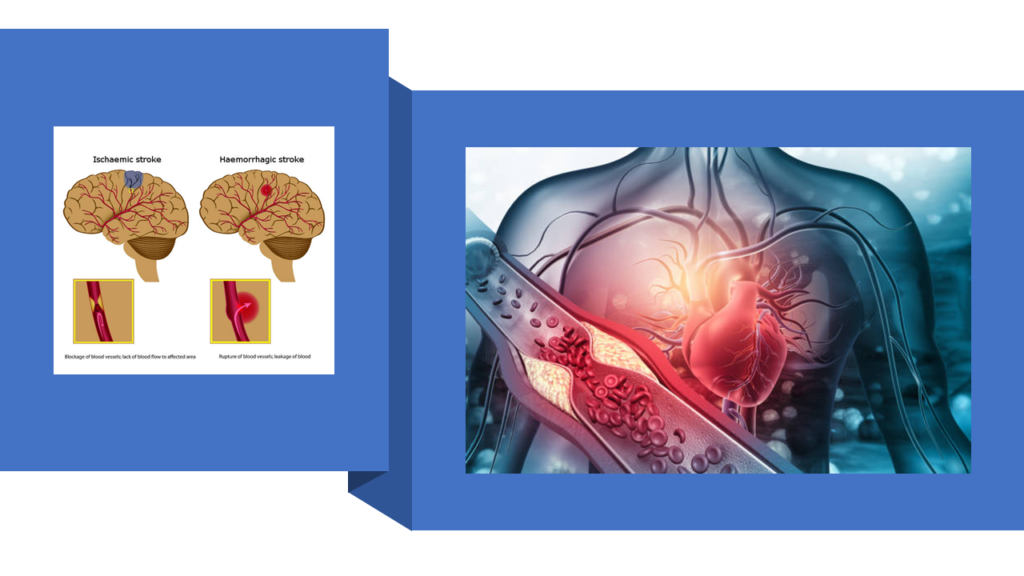
One may ask- why should any of these pipes get damaged?
Simple laws of physics apply here. Blood is continuously flowing through these pipes. And this flow creates friction. This friction keeps damaging the inner linings of these pipes.
Now, you have to remember that these pipes are made of living cells. So, damage here literally means there are cells dying. Many cells die due to the friction caused by flowing blood. Many die just because they have become old and inefficient. Many die because of some toxins flowing within blood. But these damages are also getting repaired continuously. And repair here involves removal of dead cells and replacing them with healthy living cells.
It’s common sense that if the rate of damage is more than the rate of repair, the pipe will eventually either get blocked or it will burst open. Either way, the organ supplied by this pipe will suffer. If it’s a pipe supplying the heart- it will cause a heart attack. If it’s a pipe supplying the brain- it will lead to stroke.
So, in summary, anything that will increase the rate of damage or anything that will decrease the rate of repair can cause stroke or heart attack
Then the next important question is what can increase the rate of damage? And what can decrease the rate of repair?
There are thousands of factors that can increase the rate of damage. And scientists will use quite complicated medical jargons to explain these factors and how they cause accelerated damage. But, there is a simpler way to understand.
All you have to remember is that any factor that causes damage anywhere in our body first leads to a process called inflammation. Inflammation can be imagined as the flame of fire. Anything we do always causes some damage and always leads to inflammation. Each breath we take causes inflammation. Each morsel of food we eat causes inflammation. Even each flow of thought will cause inflammation. Inflammation is synonymous to damage. So, the rate of damage is directly proportional to the level of inflammation.
So long as such damage is completely repaired, there is no issue. But, inefficient/incomplete repair can be dangerous. And that’s because- any residual damage leads to further damage. It’s just like fire- if you haven’t extinguished it completely, it can potentially cause a whole forest to burn down
What this implies is that if the rate of repair has gone down or if the process of repair has become inefficient, it can itself contribute to more damage.
Also, damage caused by inflammation can itself slow down the rate of repair, if the inflammation level is too high.
Just like forest fire. If it’s too hot, it can potentially kill firefighters and slow down the process of firefighting.
In summary, inflammation is the key player that accelerates damage and even slows down the rate of repair.
Then logically one must ask- what can cause inflammation to go uncontrolled?
What can cause inflammation to go uncontrolled?
Age is the answer. When we are young our body has an amazing capacity to extinguish all the fire ignited by inflammation. All damages get repaired completely when we are young. But, as we age, our body’s ability to tame inflammation keeps dwindling. This means slowly and slowly more and more flames of inflammation keep remaining unextinguished. With age, our ability to repair damages keeps weakening. Some amount of damages keep remaining unrepaired. And we just discussed- residual damages cause more damage. Untamed inflammation keeps destroying our ability to repair damages. It becomes a dangerous cycle that eventually leads to fatal consequences such as heart attack or stroke. And that’s why you see medical complications such as heart attacks and strokes generally occur more frequently in elderly population.
But if this all true, then how does one explain the alarming increase of stroke and heart attacks in young adults that we are seeing around us?
As a population we are all aging faster
What do you mean we are aging faster- one may question! If someone is 35, he/she won’t become 40 next year.
So, let me explain this. When we talk about age, we generally refer to chronological age. But, biological age is what determines health and not chronological age. Chronological age is the amount of time a body has spent living after birth. Biological age refers to the condition of the body in terms of its efficiency.
A super healthy 80-year-old man can have a body condition matching that of a 50-year-old. Here the biological age of this fit 80-year-old man is then around 50 years. Similarly, a 30-year-old person can have a very unhealthy body with lots of diseases. The body condition of such a person might match that of a 70-year-old person. Here the biological age of this unhealthy 30-year-old man is then around 70 years.
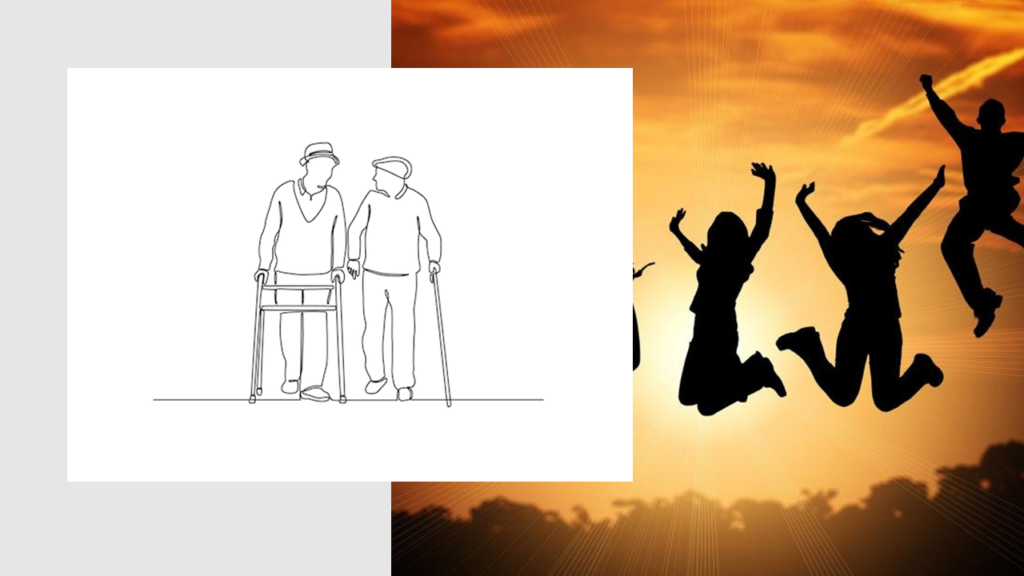
Chronological age has no relevance when we talk about human health and diseases. So, in this article when I say age, I am always referring to biological age. It is this biological aging that keeps pumping up inflammation leading to increased rate of cellular damage and decreased rate of repair.
It’s a fact that as a population our biological age is increasing faster than our chronological age.
We are all aging faster than ever. So, the diseases that earlier would affect elderly population are now affecting us much earlier in life. And this is exactly the reason why slowly, but surely more and more young adults are dying from heart attacks and strokes.
But then, several of these young adults who died due to stroke or heart attack were seemingly quite healthy. Many of these had been slim and well built, regularly going to gym, never smoking and eating only nutritious food.
How is it possible that such young and fit men were biologically old?
Lean and Muscular Might Not be Equal to “Being Healthy”
Physical appearance can be deceiving. There can be processes fanning the fire of inflammation leading to accelerated aging, despite lean figure and muscular physique. And one such critical process is stress. We all ignore stress considering that it’s only an abstract psychological thing- but it is a major factor driving inflammation and aging. If you have stressful work life, going to gym might not be enough to compensate for the damage caused by that stress.
Also, one must remember that though exercise is good, too much exertion simply adds to stress and inflammation. It’s good to push your limits- but you do it too much and it’s no longer healthy. Impact of going to the gym has an inverted U-shaped effect. Going to the gym is good. The more you push, the healthier you become. But that push has a limit beyond which the effects on health are actually negative.
If biological aging speeds up, there is a high risk of dying due to complications such as heart attack or stroke. Inflammation is the key player accelerating biological aging. Mental stress can substantially add to inflammation. Too much physical stress is also bad and can add to inflammation.
How COVID-19 pandemic has increased the occurrence of heart attacks and strokes in young adults?
COVID-19 infection can potentially accelerate the biological aging process, especially in people who already have a lot of ongoing inflammation in the body. When COVID-19 virus infects, our body tries to fight it by launching our immune system against the virus. When our immune system attacks the virus, it leads to inflammation. And COVID-19 virus multiplies rapidly into millions. More the virus, more is the immune stimulation, and more will be the inflammation. The virus that caused the delta wave, typically led to very high degree of inflammation. And we just discussed how inflammation accelerates biological aging, and how biological aging causes heart attacks and strokes. So, if somebody is already old biologically due to an already existent excessive inflammation, COVID-19 infection can be a death sentence. Similarly, if someone is young and slim, but has aged too much biologically- that person is likely to suffer a stroke or heart attack a few months post COVID-19 infection.
I have written a full detailed article on how post COVID complications develop and how they can be prevented. To read the same, please click HERE.
How does one know if he has critically aged biologically?
Is there a way to measure this biological age?
There are actually a lot of complex methodologies to measure biological health. But knowing the exact biological age is of no relevance. You just need to know if your biological age is so bad that you are at high risk of fatal diseases. The easiest way to know this is by doing a lab test called CD4:CD8. If this ratio is >1, your biological aging is not too bad. If it’s <1, then you really need to start worrying.
This test should be available nearly with any decently equipped lab. CD4:CD8 ratio test is the same test that is used to monitor if HIV- AIDS patients are going to develop AIDS related complications. And hence the test is quite cheap and widely available.
I have written in great detail about this test in an earlier article. To read the same, please click HERE.
Preventing Heart Attacks and Strokes
So, we are all aging faster than our earlier generations. And it is this aging process which eventually disrupts blood flow to the heart or brain, leading to fatal complications such as heart attack and stroke. We also saw that stress contributes significantly to this aging. And we all know that stress is reality for most of us. It’s a constant thing. We discussed that just going to gym might not be the answer at all.
So, are we saying that there is nothing that can be done?
There is actually a lot that can be done. Aging is a natural phenomenon. No machine can continue functioning perfectly forever. With time, wear and tear processes eventually damage any machine with time. With proper maintenance, one can definitely delay and keep the machine going much longer. Our body is a biological machine. Fortunately, we have in- built repair and maintenance mechanisms that serve to reverse the damages done by inflammation. But, as we age, this repair system itself keeps becoming weaker. Inflammation itself can accelerate weakening of this repair system. And weaker the repair system, more is the rise in inflammation and corresponding damage to the body.
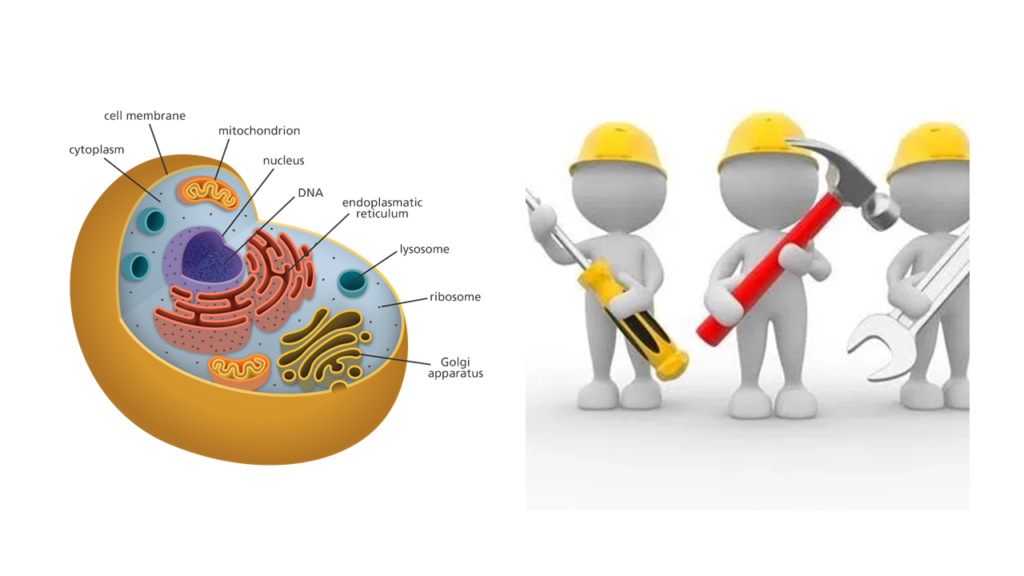
The only logical way to slow our biological aging process is to keep the inflammation level as low as possible.
But how does one go about it?
Any biological process results in inflammation. The key is to keep the flow of these biological processes smooth. Inflammation may be imagined as heat caused by friction. More the friction, more is the heat. Friction is also proportional to pace- faster the process more will be the friction and resultant heat.
So, there are two key principles to keep inflammation under control- slow down the biological processes and keep them smooth.
But, if the inflammation level is already very high, it first needs to be tackled. If the fire is raging hot, it needs to be cooled down first.
Controlling the fire of existing inflammation
We know that stress can’t be avoided by every one of us. Life is a struggle and struggle will result in stress, which eventually acts as gasoline to the fire of inflammation. Our food habits are such that they definitely heighten the level of inflammation. The environment around us is generally conducive towards generating excessive inflammation. All these factors contribute together to result in a gigantic fireball of inflammation that cannot be controlled by our routine repair processes. And that’s why we are aging so fast. That’s why people get chronic diseases such as diabetes and hypertension so early.
So, the first step should be to try to bring down this accumulated inflammation and keep generation of further inflammation under control.
So, how does one achieve this?
There are specific medicines which can be utilized. I generally recommend a combination of Aspirin 75 mg, Metformin 500 mg and Atorvastatin 10 mg once daily. This recommendation is not based on some assumption. There is a huge body of evidence supporting the same. Together, these medicines can substantially prevent risk of diseases such as cancer, diabetes, high blood pressure, high cholesterol, heart diseases etc. (Check the links for references).
But I want to stress here to my readers that- please first consult your physician before resorting to any of these medicines. Don’t try any of these medicines without consulting your doctor.
Should everyone take these medicines?
Of course not. If you are healthy and fit in the true sense, you don’t need these medicines. But if you have aged biologically, these medicines would help protect you against complications such as heart attacks etc.
One may do the CD4:CD8 ratio test, and if the ratio is <1 one might take these medicines after consulting his/her physician.
But, again, not everyone would want to do CD4:CD8 ratio test.
So, in general, if you are >40 years old you may take these medicines daily, after consulting your doctor. Else, if you are a patient of diabetes or high blood pressure or heart disease or any other chronic disease like rheumatoid arthritis, hypothyroidism etc, one should consider taking these medicines daily.
Similarly, if one got infected with COVID-19 and the recovery was a difficult one, one must take these 3 medicines at least for the next 3 months post recovery (For more details on this, please click HERE.).
But also remember- medicines I suggested here are just shortcuts. If you are ready for a disciplined life, one can certainly avoid resorting to these medicines.
How To Slow Down Biological Aging Without Taking Any Medicines?
As we discussed earlier, there are two key principles to keep inflammation under control- slow down the biological processes and keep them smooth.
Each morsel of food we eat, each breath we take and each thought that emanates from our brain potentially lead to inflammation.
If we control the amount of food, it significantly cuts down the inflammation. So, the first method I would recommend to slow aging is to follow fasting techniques in a disciplined fashion.
Fasting Slows Down Aging
Fasting is recommended and practiced in almost all cultures and religions across the world. Ramadan, Lent, Ekadashi, Shivratri- these are religious fasting practiced for thousands of years. While people follow these to attain spiritual goals, I truly believe that religion is a way of making people adopt scientific practices that have beneficial impact on health.
Fasting is actually a therapeutic recommendation by several medical texts across various cultures. And now modern science is whole-heartedly agreeing on this. There are now tons of research establishing how fasting slows down biological aging and can prevent diseases like cancer, heart attacks etc.
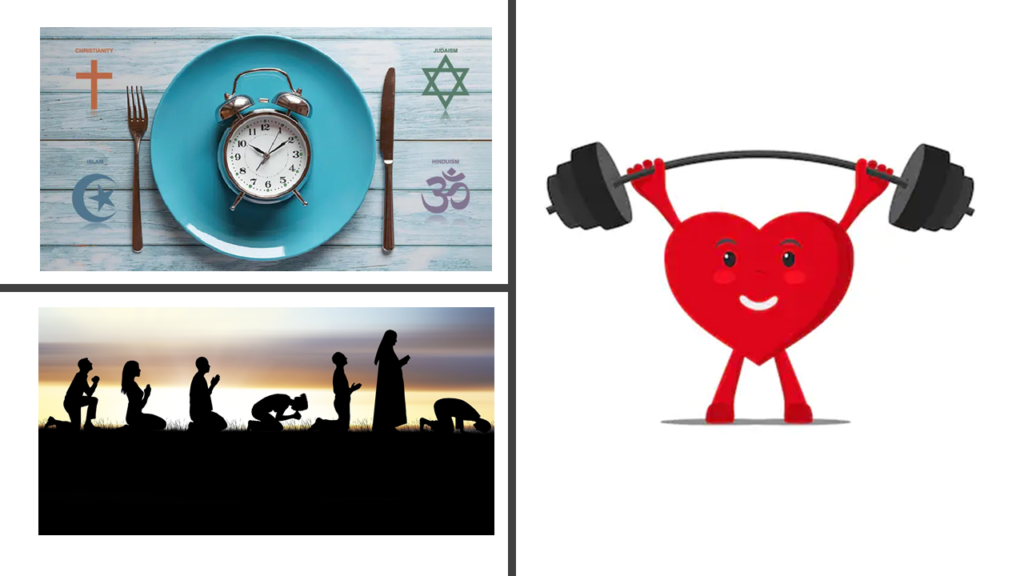
Many people ask if there is a specific way of fasting which is most optimal.
Irrespective of what way you choose to fast, you need to remember two important things- when you are fasting it means the gap between 2 meals has to be a minimum of 16 hours. The other thing is, when you start the fast or break the fast you need to be mindful of how much you eat. You can’t afford to dump yourself with too much food thinking that this will help you endure 16 hours of fasting. Similarly, you cannot over-eat after you break the fasting. Just be mindful.
More the calories you eat, the more will be the inflammation. So- overeating will simply negate the effects of fasting.
There are various techniques to practice fasting. Some people follow intermittent fasting. Some people simply won’t eat between 2 consecutive sunrises- which means they fast for 24 hours straight. Followers of Jain religion follow a simple rule- they don’t eat anything after sunset. It doesn’t matter what technique you follow- but it’s important to fast regularly. Either you do intermittent fasting every day or go for a complete 24 hours fasting twice every week. And be mindful of how much you eat.
Regular fasting slows down inflammation emanating due to food and related processes.
I have written in great detail about this test in an earlier article. To read the same, please click HERE.
Is there a link between what you eat and aging?
You must have heard doctors claiming that cutting gluten, dairy and sugar out of your food can significantly reduce inflammation.
There is definitely a direct link between what you eat and the amount of inflammation that can result from that.
First, let’s talk about today’s popular fad about cutting gluten, dairy and sugar. I have my opinions reserved on this. I come from a culture where people have been drinking milk every day, and this has been going on for thousands of years. And I don’t think my ancestors fared badly in terms of health and longevity. Same is true about gluten. Gluten is a protein found in wheat. Similarly, in my culture- which is several thousand years old- people have been eating sweets with nearly every meal. Suddenly now we have experts around us claiming that gluten is bad or that one must cut down on dairy and sugars because they are bad for health.
So, am I saying that these experts are incorrect?
I personally feel that they are not fully incorrect. But there are aspects we need to really understand before deciding if gluten or dairy or sugar is bad for someone. As I said, gluten is a protein. Similarly, dairy products contain lactose, which is another protein. Any protein coming from outside into our body is treated like any bacteria or virus. But once the body realizes that this protein is harmless it stops reacting to such harmless proteins as gluten or lactose. This process of stopping to react to something harmless is known as tolerance. However, in some people, the body doesn’t develop this tolerance. And this leads to what we know as gluten intolerance or lactose intolerance.
How to cure such intolerance is a long discussion and I will have to write a whole new article just on this. But it’s generally easy to take care of such intolerance in kids. In my opinion kids with intolerance to any food should be allowed to develop tolerance, rather than completely avoiding those food items. (I know a lot of you won’t agree on this, just by reading this sentence. I will soon write a detailed article on this.)
However, any adult with such intolerance should definitely avoid the food item to which he/she is intolerant. Else it will flare up inflammation. This is where I do agree with these experts. But I don’t agree that everyone should avoid gluten or dairy products.
Similarly, today lot of experts are “anti- sugar”. Zero sugar is the new mantra for health.
But the story of sugar is actually a story about calories. I want to repeat that inflammation is directly proportional to the amount of calories you eat. Sugar is not the evil, if the total caloric intake is under control. If you evaluate why diets such as keto or paleo succeed, it is actually not because they don’t contain sugar- the total daily calorie intake itself gets reduced substantially in such diets. Issue with sugar is that you feel hungry quickly, while with keto or paleo diets hunger remains suppressed. So, I will again say this- sugar is not bad if you can control the total daily calorie intake.
Genetics and Seasons of Food
You must also keep in mind that what you eat can have a significant impact depending on who you are. One type of food that is good for one might not be good for someone else.
My ancestors come from eastern part of India, which is coastal in nature. My ancestors have been living there since thousands of years. They have been having mostly fish, rice, coconut and mustard. So, over thousands of years, my ancestors’ bodies molded the genetics such that it’s optimal to digest fish, rice, coconut and mustard. Based on this genetic reality, even my body would find it a lot easier to digest fish, rice, coconut and mustard without much friction. In other words, such diet would keep inflammation low. My ancestors never ate beef or pork. So, my genetic makeup might find it stressful to digest these meats and lead to more inflammation.
There is also seasonality associated with this genetics of food. Depending on the existing season, your genetic make- up is optimized to digest food coming from plants that grow in that particular season in that specific region where your ancestors evolved.
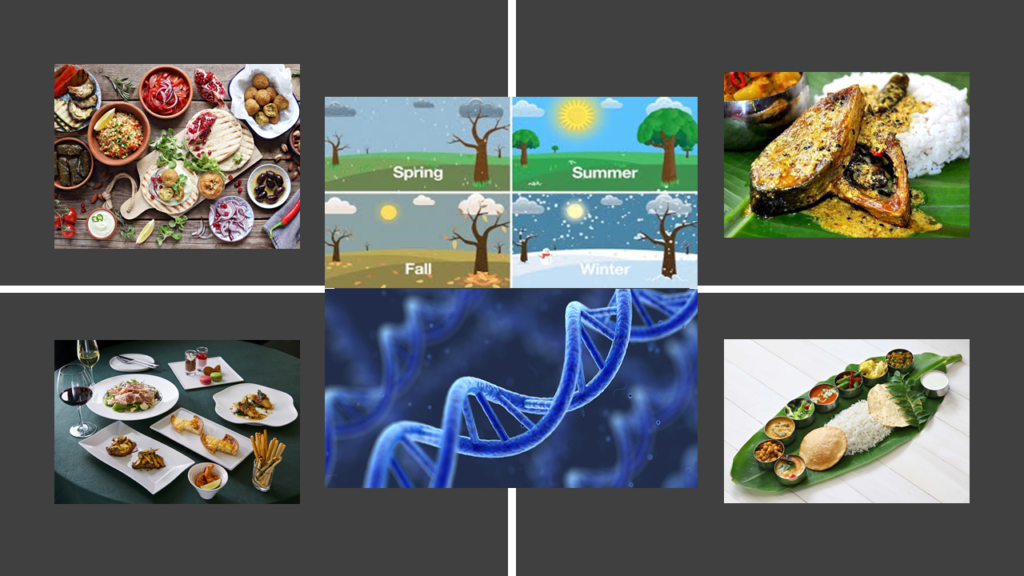
Issue is in today’s generation our ancestral lines are blurred. Similarly, many communities migrated from one region to another and then another. I really do not know how to determine what is the best food for my body. We have become way too global and mixed to really pinpoint and say which regional/seasonal food is best suited for me.
Then, how do you find what food is best for you?
It’s actually simple. Just listen to your body. Anything that leads to inflammation is disliked by the body. Anything that reduces inflammation is loved by the body. So, if you feel energized and happy after eating something, that’s the right food for you. If you feel dull and dissatisfied after eating something, avoid that food. This is actually how you must decide if gluten, dairy etc must be avoided. If you feel bloated and uncomfortable after drinking milk, definitely you must avoid taking dairy products (if you are an adult).
It seems the Ayurveda system has a more definitive way of finding out what food is right for you. I am no expert in Ayurveda though. But, depending on your body type there are certain foods recommended during specific seasons to keep the inflammation under control.
So, the first method towards slowing biological aging is to practice fasting and eating right.
Think Right and Breathe Right
The next method I want to discuss would focus on slowing down inflammation emanating from breathing and thoughts. And that method is to simply practice meditation regularly. Make a rule to meditate for 10 minutes after you wake up in the morning and before you sleep. Of course the longer you meditate, the better it is. And the more frequently you meditate, the better it is. So, when you are working, you can add a rule to meditate for 5 minutes after every 2 hours. It will not only help decrease inflammation, you will also find yourself more focused at work.
And, one need not do any course on meditation to learn how to meditate. Simply sit comfortably, close your eyes and observe your breathing and thoughts. No need to control anything. Just observe. And that’s it.
Sleep Right To Slow Down Aging
Sleep is when our body goes into repair mode. And if that’s true, a relaxed peaceful sleep should help reduce inflammation.
If you observe sleep closely, it is based on a simple principle of healing and repair- it simply slows down all biological processes. You are basically fasting when you are asleep. Your breathing rate is lower. Your physical activity is considerably slower.
How long one must sleep? Many people wrongly believe that longer you sleep, better it is. That’s certainly not true. Just listen to your body to understand how long you must sleep. When you wake up from sleep you should feel fresh and happy. For some, this might be just 5 hours of sleep. For some, this might be 8-9 hours of sleep.
Forcing yourself to sleep longer doesn’t help and can be harmful. If you push hard to sleep more, it will just create stress and inflammation.
So- simply listen to your body and sleep only as long as your body asks you to do so. Don’t push.
Exercise Right- NOT HARD- To Slow Down Aging
Exercises help you remain healthy. But, exercising can also be a double edged sword, if done incorrectly. You need to really understand the intention of why you are exercising. Is it to build muscles and display physique? Or is it to remain fit and healthy? Exercises focusing only on muscle building might not do anything to reduce inflammation. Sometimes they can increase inflammation.
Too much exertion simply adds to stress and inflammation. It’s good to push your limits- but you do it too much and it’s no longer healthy. Impact of exercising vigorously actually has an inverted U shaped effect. The more you push, the healthier you become. But that push has a limit. Beyond this limit, the effects of exercising on health are actually negative.
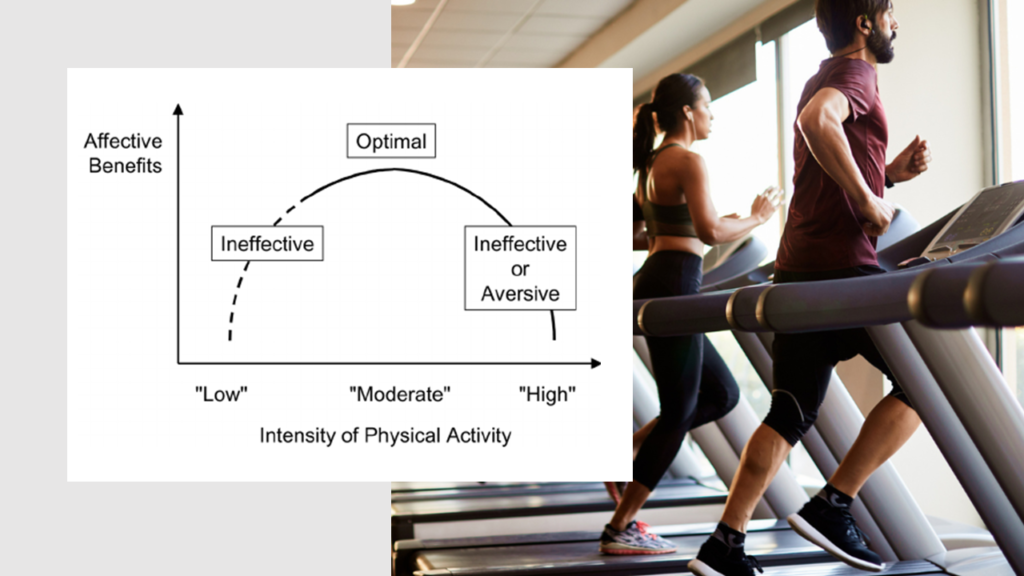
So. how does one define how much to push?
Again, answer is simple- just listen to your body. If you like the push, go for it. If the push is harmful, your body won’t like it. Body is the best doctor. It knows exactly what increases inflammation and what decreases inflammation.
Tackle Stress To Slow Down Aging
One factor critical for making biological processes smooth and slow down aging is to control mental stress.
But we all know that in today’s world mental stress is an unavoidable reality. Everyone needs to ensure food, clothing and shelter. Once that’s done, we get stressed with higher asks such a want for promotion or power or money etc. In this world of greed and wants, mental stress is truly unavoidable.
But, if you listen to your body, maybe you will find ways to avoid this unavoidable stress as well.
Mental stress has an inverse relationship with success and happiness. We focus a lot nowadays on achieving success by killing our comfort zone and stretching ourselves. But, we generally succeed if we are in love with what we do. And that brings genuine happiness. Love is the main foundation. Rest everything comes automatically. If you are doing what you love, you will be genuinely excited to experiment new things and keep learning. And this form of experimentation is the stretch that doesn’t generate harmful stress. (Do read my article on the science behind this happiness by clicking HERE)
Happiness also emanates from our relationships. If you have strong ties with your family and friends, you are generally happy and stress free. And such stress-free life due to strong interpersonal relationships directly acts to lower inflammation and decrease chances of medical complications like heart attack and stroke. There are a lot of scientific studies proving this phenomenon.
There are several examples around us. You must have seen old people in Italy smoking all day and drinking wine, but living a really long and healthy life. Neither smoking nor wine interfere with longevity and health. It’s their stress-free family ties that keep them happy and healthy.

In another article I have explained in great detail how strong relationships lead to improved health and longevity. Click HERE to read that article.
Concluding Remarks
So, the bottom line is to focus on listening to your body. Do what you love. Eat whatever makes your body feel good after eating.
Listening to your body is the key mantra. Do anything that makes you feel happy and active. Meditation, fasting, right food, right exercise- they all end up making you feel active and happy.
Happiness is a potent weapon against inflammation. Routine meditation and fasting, by reducing the amount of inflammation, can help prevent heart attacks and strokes.
If we fast regularly, meditate, exercise, and be happy- we are sorted. But unfortunately, what is ideal is not always practical. I don’t think everyone can be disciplined enough to fast regularly and exercise and meditate. And there are so many factors beyond our control. Is it possible to always do what you love? Is it possible for everyone to choose his/her profession of choice? Is it possible for all to have strong social connections?
Hence, I still tend to think a combination of medicines like Aspirin 75 mg, Metformin 500 mg and Atorvastatin 10 mg once daily should help. This is especially applicable if you are more than 40 years old, or you are suffering from any of the chronic diseases like diabetes, high blood pressure etc.
Of course, these medicines should be taken only in consultation with a doctor.
What are your thoughts on this? Please share in the comments section!





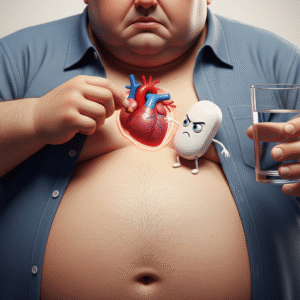
I’ve been absent for a while, but now I remember why I used to love this web site. Thank you, I will try and check back more frequently. How frequently you update your site?
I am really happy that you enjoyed reading my post!
Hi there! This post couldn’t be written any better! Reading through this post reminds me of my previous room mate! He always kept talking about this. I will forward this article to him. Pretty sure he will have a good read. Thank you for sharing!
Thank you- I am really glad that you liked reading this post!
Reading your article helped me a lot and I agree with you. But I still have some doubts, can you clarify for me? I’ll keep an eye out for your answers.
Reading your article helped me a lot and I agree with you. But I still have some doubts, can you clarify for me? I’ll keep an eye out for your answers.
For my thesis, I consulted a lot of information, read your article made me feel a lot, benefited me a lot from it, thank you for your help. Thanks!
Reading your article has greatly helped me, and I agree with you. But I still have some questions. Can you help me? I will pay attention to your answer. thank you.
I value the blog post.Thanks Again. Cool.